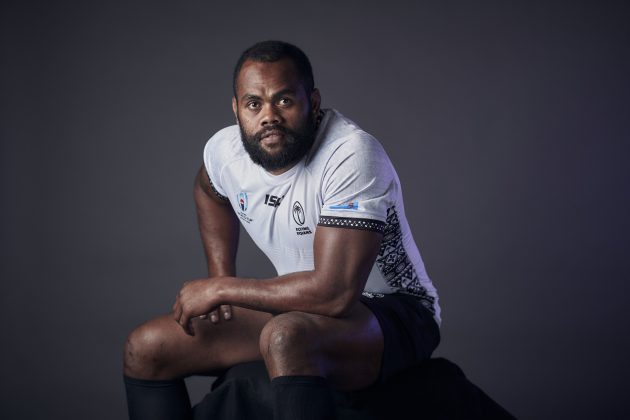The Fijian force on making a name for himself in France and the Rugby World Cup mindset. This feature first appeared in the September edition of Rugby World.
With A year still to go on Peceli Yato’s contract, and the player himself saying “I really want to stay – it’s like home”, it wasn’t exactly panic stations for Clermont. But when the back-row recently signed a new deal with the club until 2023, the rest of the Top 14 must have had to pardon their French.
Quite simply, the Fiji back-row has become one of the most imposing figures in France, racking up vast yardage with ball in hand and bullying attackers.
Yato talks freely of the support and love he has felt from the folk of the Auvergne, of how he adores his life there, and certainly there is a sense that he is at one with the famous side now. Yet it was not an instantaneous rise to Top 14 dominance for the Sigatoka lad.
An émigré as a teenager, Yato had to work through the initially tough settling-in period in a foreign country, sometimes relying on the help of kids a few years younger than him. He explains as much after adroitly handling a compliment chucked at him about juggling languages.
“Seriously, my French is better than my English right now!” says Yato with a laugh. “It’s been seven years for me now in France and it was 12 years of learning English in Fiji. I came to France at 18 and I couldn’t speak any French. But my family back home speak Fijian at all times, so I didn’t get much chance to speak English.

Fired up: Playing in the knock-outs of the Challenge Cup (INPHO)
“Moving was kind of weird, first of all because of the language. I didn’t really understand anything, I didn’t even know what was going on in training. Luckily there were a few students there in the espoirs (youth section) who usually helped me with my French. I had to socialise with them a lot and learnt casual French – not proper French. I also took a class which really helped.”
Much has been discussed about the ethics of foreign powers setting up shop in the Pacific region and establishing rugby academies. Yet, whatever your view of these practices, Yato was drawn across to a new life in Europe and is appreciative of the opportunity. He had to learn quickly before this was a possibility, mind you. He only began taking the game seriously at 17, but Yato credits Fiji-based French coach Franck Boivert for recognising his talent and quickly dragging him up to the standard that ultimately earned him a move.
Not that Yato was always set on life as a sportsman. He had other plans – and even initially hid his athletic exploits – before it was decided that a sojourn with rugby was best for him and his family.
“I really wanted to become a soldier,” Yato levels with us. “It wasn’t a good idea for me to do that, my dad wanted me to play rugby (when the time came to make a decision). I’m not sure why, maybe he was afraid I would get killed somewhere, so I would get out playing rugby instead.
“I’m still a big fan of soldiers. My father is a farmer and I grew up on a farm back in Sigatoka.
“My dad really wanted me to go to school, so I could help my family. So I would come down to the college, then I went to town, took off my uniform and changed my clothes so I could go to training. I would play rugby, come back again, put on my uniform and go back home and my dad didn’t even know I was playing rugby. I was 17 by that time.”
The rest, as they say, is a history of opponents strewn in his wake.

Pacific rivals: Facing Tonga in Auckland (Getty Images)
Of course, fans of the Flying Fijians and more than a handful of neutrals will hope the industrious back-rower will be equally as robust in the upcoming Rugby World Cup, hammering into Pool D.
Yato has taken note of some journalists proclaiming that this time Fiji can wreak real havoc, but the breakaway offers a serious caveat, saying: “If the team want to do that kind of damage it’s all in the mindset.” He believes it is time to fulfil some undoubted potential and to sharpen the work in each of Fiji’s team units.
Going on, he says: “It’s true we have an exciting back row. But like I said, it’s about how prepared we are and if we have good communication as a back row, we will make work easier for the others. So we have to work on our fitness, we have to work on our game plan. Because the team rely on us – the back row is going to be the ones who take control, who are looking for the ball.
“The result will be good for us if the back row do our job.”
There is one team Yato would love to get in his crosshairs should he take the field against them in Japan: above all others, he wants to beat the Wallabies.
He has lost to them before but more than that, he says, he wants to make history. The irony is that after the season he has had and the more settled Yato feels, the more nervous established sides like Australia must feel.
This feature first appeared in the September edition of Rugby World.





